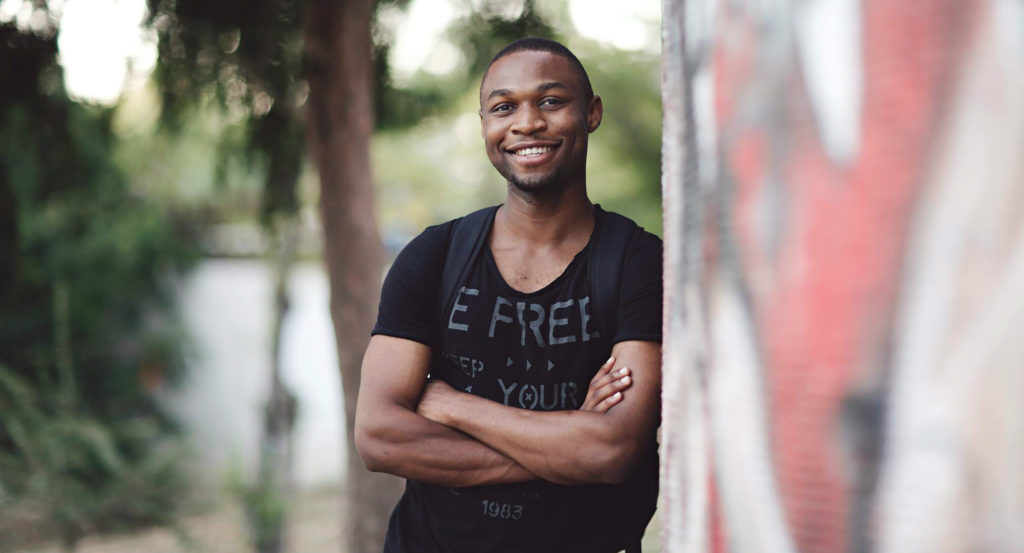The expat scene in Istanbul, as it is in many places, is one rather preoccupied with the preservation of the cultural habits of home, wherever that may be. To local residents, this is the behavior expats are perhaps best known for. However, the less often observed flip side of the expat life is its celebration of local culture. Whether it’s the yemek, the sanat, or the çay, most expats find plenty to love about life in Istanbul. Joel Moriasi is one exemplary example. A 5-year expat and student of mass media at Marmara University, he has an interest in everything video and has been on the Turkish YouTube scene for a year now.
One of the unfortunately too few expats who’ve learned to speak Turkish, he created a Turkish-language YouTube channel, Türkiye’de Bir Afrikalı, where he shares his thoughts and experiences as a young African in Turkey with his Turkish followers. Recently he posted a video that went viral wherein he shared his appreciation for Turkish rapper Ceza. It’s not every day that an expat in Istanbul gains attention for rapping in Turkish, and it’s even rarer for a Yabangee contributor to do so. Joel sat down recently with Yabangee to answer a few questions and share a few thoughts about the blossoming of a YouTube star in Turkey.

What brought you to Turkey?
I got a scholarship under a bilateral agreement between the Govt. of Kenya and that of Turkey. I was originally planning to study in my home country but the idea of studying the same thing in a different country and language seemed cool to me. Plus, I didn’t have to pay for it.
How long have you been a Youtuber? What was your first successful video?
I have been on YouTube since last year April. Exactly one year this month. Since then I’ve done over 20 videos and my first ‘successful’ video is the one where I talk about what Africans think about Turkish people. It got a lot of good, positive feedback from the commenters. I think any community would be curious of how they are perceived by their visitors.
What are some of the subjects you most wanted to tackle with your YouTube videos?
Being an African, I face an interesting kind of experience here largely because of two main reasons, the first one being prejudice. There is a lot of preconceived notions of what Africa is and who an African would be, many of which are not true anymore or were never true in the first place. The other one is a lack of interest in Africa in general. In almost all my interactions with new people, I find myself answering the same set of questions over and over again, questions whose answers are readily available to anyone who has the slightest bit of interest. So, I though making a YouTube channel answering these questions and creating interest in matters African in a fun kind of way would make everyone’s life easier.
In your most recent video, you’re singing and rapping parts of your favorite Turkish songs. How quickly did you get into Turkish music after moving here?
It was hard to get hooked into the music, and actually I do not like most of the popular songs out there. However, I was immediately hooked to Ceza since day one. As a lover of rap music and what it represents, I could not help but like his style. I never understood a word he said but I just liked the rhymes. As my Turkish improved I started understanding him more to the point I was able to sing along.
How long did it take you to be able to rap Ceza’s Suspus? Is Turkish your best rap language?
I think it took me about a month to be able to rap this particular song. However, since it’s so fast, I never was able to keep up with him for like another month. By the way I was not practicing so as to sing or make a video of it one day. It just started as a challenge with my friends. I would not say Turkish is my best rap language, since after liking it I became even more curious of how other languages would go with rap music.
What’s the future of your Turkiye’de Bir Afrikali channel?
It’s really difficult to predict the future just from this particular video blowing up, but looking at the over one thousand positive comments, I see a lot of people who are curious about who I am and would like to see more of what I have to offer. So, I think making more videos is an answer to this question. But if I can be specific, I would say cultural exchange and beating the shit out of stereotypes using entertaining videos.
What are some things you’d tell another Yabangee who’s thinking of launching themselves on Youtube?
First of all, you as a Yabangee, have an advantage by just being different. But it’s not good enough. You really have to offer some sort of value to the viewer, be it entertainment or knowledge. And obviously, you have to have some level of Turkish language. You also have to develop thick skin in regards to negativity, but I think this goes for anyone who puts themselves out there. Finally, I would add patience. It took me less than 24 hours to gain more than double the number of subscribers that I had gained in the year before it. This was from just another regular video of mine that went viral. You can’t plan these things.
You can follow Joel via his Youtube channel or on Instagram.









